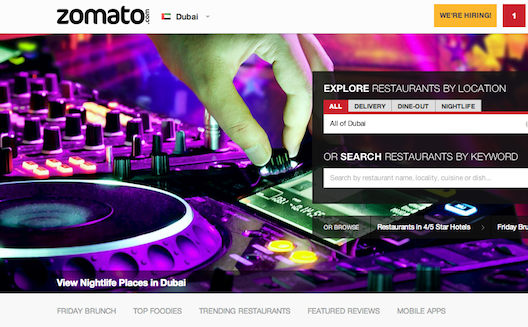Can Indian Review Site Zomato Satisfy the Gulf?


India's market of over 1 billion has been enough to sustain most of
its tech startups, including success story FlipKart, the online
book retailer that has now raisde over $180 million in funding and
is set to reach $10 billion in sales by 2014.
Yet an increasing number are finding their way to the lucrative
Gulf market. One of the latest is Zomato, a restaurant and nightclub review
portal with a sleeker interface than U.S.-based Yelp.
Since its launch in New Delhi in July 2008, the site has gained
over 82.1 million users. Six months ago, the site's founders set
their sights on the UAE for their first international
expansion.
“Wherever we see a good English speaking market with an opportunity
both on the user as on the merchant site, we jump onto it,”
explains co-founder Pankaj Chaddah.
In the UAE, his only competition were sites like Time Out,
Fodor’s, and the Explorer- none of which are interactive.
User-generated review website YaDig is its closest competitor, but,
with 250,000 viewers per month and gaining, Zomato could be on
track to take over.
To differentiate from its competitors, the site is focusing on three things:
- Making reviews comprehensive. With a
team on the ground, it's ensuring that the site features every
restaurant in the city, documenting smoking areas,
facilities, parking. From there, they let the users review the
restaurants.
- Ensuring quality reviews. To engage users, the
site is using a few gamification techniques, creating a friendly
badge system. Users start out as a foodie, and reach the levels of
big foodie, super foodie, and finally, connoisseur, as they write
more reviews and gain followers. Not only does this entice users to
participate more, but it also ensures that the reviews of the best
users stand out. The Zomato team has also invested heavily in
automatic and manual spam control to prevent fake
reviews.
- Contacting some of their best users and inviting them to lunch. For the super foodies invited, it’s a free meal and a sign of appreciation; for Zomato, it’s a direct access to fresh feedback, and a way to sustain participation. In India, the company has even invited food celebrities alone to make these meetups that much more special. Super users will also see their reviews on paper in Zomato’s print edition, The Connoisseur's Guide to Eating Out; a Dubai version will be released in September.
With these strategies, the team has kept its branding
consistent, not changing any of the looks, features, and
functionalities for their Dubai site (although they did add a
shisha feature).
Challenges
Even though Chaddah believes that picking the UAE was the right
move, it hasn’t been that easy to implement. The hardest part of
expanding in any country, he says, is determining the local
regulatory structure. Fortunately, this will get easier each time
they expand.
Another challenge has been the talent pool. “Don’t be afraid to
bring in talents from abroad,” he advises. For its launch in Dubai,
in fact, Chaddah hired directly from Scotland and the U.S.
Zomato now has big plans for 2013: it unveiled a Qatari
version a month ago,
launched a Philippines version today, and plans to launch
soon in South Africa, England, Turkey, Brazil, South Africa,
Kuwait, and Lebanon. Once they will have expanded to those
developing countries, they intend to measure themselves against
Yelp in the U.S.
Perhaps, by staying focused on an excellent interface, they might
be able to claw some market share from Yelp, but Yelp also offers
very simple divisions by category on the homepage, and has expanded
far beyond restaurants. For now, the race is on with YaDig in the
UAE for the top review site.


